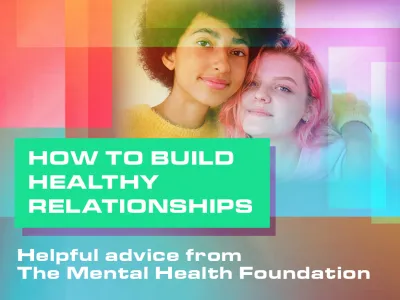
Mythbusting sex and relationships, with Brook
Written by Brook, the UK’s leading sexual health and wellbeing charity for under 25s.
For Sexual Health Week, we teamed up with the experts at Brook to bust some myths around sex and relationships. From birth control to STDs, arguing with your partner to losing your virginity, your questions have been answered honestly and frankly by experts in the field and are intended for those above the age of consent (that’s 16 in the UK!). Here’s what they had to say...
Myth: Everyone is having sex and enjoying it
Reality: Sex is spoken about or alluded to a lot in society. From advertising campaigns to TV and film, we really do get a lot of different messaging about sex from lots of different sources. Sometimes this can result in us feeling like everyone is having sex all time and that everyone enjoys or at least feels the same way about it. First and foremost, it’s important to clarify that not everyone is having sex! For many people, sex is an important part of their lives and their relationships, but for others it really isn’t. Lots of things can inform how we feel about sex too, and these feelings can change over our lifetimes. Any and all feelings about sex are valid and you should feel safe enough to speak about your thoughts and emotions with your partner, if you choose to have one. It’s also important for us to know that some people experience little or no sexual desire at all. People who identify as asexual may describe their experiences in this way. It can be helpful to think of sexual desire or sexual attraction as a spectrum. All of us are somewhere on this spectrum and deserve to have that respected.
Myth: Sex irl is the same as in film and tv
Reality: It’s useful for us to know that sex on tv and in films is crafted for entertainment purposes. In the same way that films add drama and tension to action scenes to create excitement, they also do the same when portraying sex. The point of these scenes is not to provide us with factual information or representation of what sex is like, but rather to entertain us and make sure we keep watching the film or show. Often, the way sex is shown in films is not accurate to how it is in real life. Things have improved, for example films nowadays will often show characters using condoms or at least talking about contraception before sex, but we still have a long way to go. Sometimes these inaccurate representations of sex can make us feel like we’re ‘not doing sex right’ or make us feel pressured to have sex in a certain way, but it’s important to know that there’s no set way that sex should be. As long as it’s safe, consensual and an enjoyable experience for everyone involved, then it’s all good!
Myth: Hormonal birth control is bad for you
Reality: Like all medications, hormonal birth control affects everyone differently. Some people experience side effects to some types of hormonal birth control but equally many people don’t! If you want to prevent pregnancy, there are many types of contraception both hormonal and non-hormonal to choose from, from the patch to the IUS, the implant to condoms. It is always best to speak to speak to your doctor or sexual health practice nurse about the different options available and discuss which may work for you. If you do have any difficulties or side effects with your contraception you can always speak to your doctor about changing your contraception method. It is important to note that condoms are the only contraceptive method that protect against both STIs and pregnancy.
Myth: Consent is just about sex
Reality: Although this is a common misconception, this is not the case at all. We use consent in our everyday lives. When you want to eat your sibling’s last packet of crisps, and you ask them if this is okay, you are asking for their consent. We ask for consent in everyday life, including sex and this is done to respect everyone's boundaries. Having said all of this, consent is pivotal in sex because without it, the act will be sexual assault or rape, and sex where everyone has enthusiastically consented is the best sex!

Myth: You can’t get pregnant from pre-cum
Reality: While unlikely, yes, it is possible to get pregnant from pre-cum. Although its main function is as a lubricant and neutralising acidity in the urethra, it can carry sperm from the urethra into the vagina, potentially resulting in pregnancy. Even if someone can control when they ejaculate, releasing pre- cum is involuntary and cannot be controlled. Therefore, using contraception is important in preventing pregnancy.
Myth: Couples in good relationships don’t argue
Reality: This is not the case; arguments happen in some of the healthiest relationships and they are normal. However, it is how the argument is resolved and dealt with that is important, as well as the amount of arguing that is happening. Having respect for each other's differing points of views within the argument can help to lead to a positive and healthy resolution. If you are arguing a lot and it’s causing you to feel stressed and upset you might want to raise this with your partner, or reflect on how the relationship is making you feel overall.
Myth: Your ‘cherry’ can only be popped through sex
Reality: ‘Popping your cherry’ refers to the idea that first time someone has penetrative vaginal sex, it will ‘break’ their hymen. It is often used synonymously with ‘losing your virginity’. However, this is inaccurate. Firstly, the hymen is a ring of thin skin which covers part of the opening of the vagina. It does not fully cover the vaginal opening, in order to allow menstrual blood out. Often the absence of a hymen is taken as evidence that someone with a vagina has had penetrative sex, however there are a variety of reasons why this isn’t true. The hymen can stretch (not break) during many activities, including using tampons, or playing sportS. For some people their hymen may stretch during penetrative sex whereas for others there will be no change. Some people are born without a hymen at all! Secondly ‘virginity’ is not a medical or scientific term and you cannot know if someone has had sex or not from their body.
Myth: It doesn’t count as losing your virginity if you have anal sex
Reality: The concept of ‘virginity’ comes with a lot of history and cultural context (see our page ‘What is virginity’ for more information). The phrase 'Losing your virginity’ is often used as code for the first time someone may have penis-in-vagina (vaginal) sex. However, this demonstrates a restrictive idea of what sex is. It suggests oral and anal sex and hand-to-genital sexual contact may not be considered ‘sex’ when, in fact, they are all equally types of sex. This goes on to exclude those who don’t want to, or can’t have vaginal sex and places pressure on people to have a certain type of sex for it to ‘count’ as sex. Instead, the most important thing is that any sexual activity you take part in, both the first time and every time after that, is consensual and that you feel happy and comfortable.
Myth: Relationships have milestones that should happen at set times
Reality: Relationships should be approached with your personal comfort levels at the forefront. Whilst it can seem like there are times when things “should” happen, you should only ever approach those when you are ready. We can be influenced by peers, and other messages we receive from films/social media, to do things by certain times, but what is most important is that both people in the relationships feel comfortable, happy, and give their consent.
Myth: Masturbation is bad for you
Reality: On the contrary, masturbation is a natural, fun and safe way to explore your body and learn about your personal pleasure. It has been proven to release endorphins which have lots of benefits to your wellbeing, and it can be really useful in learning what is sexually pleasurable to you, helping you to understand your own wants and needs.
Myth: STI tests are only for those who sleep around
Reality: TIs can be contracted very easily if unprotected sex has happened. You could get an STI from having unprotected sex with just one partner who has an STI, even if you’ve not had sex with anyone else. The importance is on whether the sex was protected, rather than how many partners a person has had. Remember, it is barrier methods of protection that prevent the transmission of STIs.

Myth: You can’t use condoms if you’re allergic to latex
Reality: There are non-latex condoms available for people who may be allergic to latex. You can buy these or they may be available through local C-Card schemes. Check out brook.org.uk/free-condoms to find out where you can get free condoms near you.
Myth: Couples should have sex a certain number of times a day/week/month
Reality: While there is a lot of discussion in the media around the amount and type of sex people should have to have a ‘good’ sexual relationship, the reality is everyone is different and every relationship is different. Some people have sex every day, whereas for others sex isn't part of their relationship at all. The amount of sex can also vary depending on other life factors from being busy with work or school, not seeing your partner/partners for a while, feeling stressed or tired or just not wanting to have sex! It is all ‘normal’! What is more important is that sex is consensual and pleasurable for everyone involved. Talking openly and non-confrontationally to your partner/partners about the sex you are having, how you feel about it and what you want can ensure everyone is on the same page and feels listened to and valued.
Myth: Love and sex are the same thing
Reality: Love and sex, while sometimes connected, are not the same thing. Yes, for some, sex can be an expression of love and connection and for others love can partly come from having a sexual connection with someone, but they are not always required for the other to happen. Many people have great healthy sexual relationships without romantic love. Equally many people have amazing fulfilling romantic relationships where sex is not a factor. Some people identify on the asexual or aromatic spectrum (or both) where they experience little/no sexual or romantic attraction or only in certain contexts.
Myth: Contraception is a woman’s problem
Reality: This is certainly a myth. It is important for everyone to know about contraception, not only people who can get pregnant. If you are in a relationship then knowing about contraception means you will be able to support your partner. Condoms are also a type of contraception that not only prevents pregnancy but also STIs, so it’s important to know about condoms whether getting pregnant is a concern for you or not.
Myth: You can only use emergency contraception the morning after sex
Reality: Despite being commonly referred to as the morning-after pill, the emergency contraceptive pill does not need to be taken in the morning. You need to take Levonelle within three days and EllaOne within five days after unprotected sex for it to work. You also do not need to wait until the morning after! The sooner you take the emergency contraceptive pill after unprotected sex the more effective it will be at preventing pregnancy whether that be in the morning, the afternoon or in the evening. The emergency contraceptive pill works by delaying ovulation (releasing the egg) therefore if you have already ovulated, it may not be effective and it is important to speak to your sexual health clinic, GP or pharmacist about your emergency contraception options. The IUD (copper coil) can also be used as emergency contraception and can be inserted up to five days after unprotected sex, or up to five days after the earliest time you could have ovulated to prevent pregnancy.
Myth: You can get pregnant from being in a pool/hot tub where someone has ejaculated
Reality: The short answer is no. Although sperm are strong swimmers, they will not be able to enter a vagina from a pool/hot tub. Sperm does not live long outside the human body anyway and in a hot tub, bath, or pool it will live a maximum of a couple of minutes due to the temperature and chemicals present (e.g. chlorine in a swimming pool).
Myth: If a woman doesn’t orgasm, there is no chance of pregnancy
Reality: Pregnancy occurs when an egg is fertilised by a sperm. Most often this occurs when a penis ejaculates inside a vagina and an egg is fertilised, regardless of whether the person with the vagina orgasms. Pregnancy can also be medically assisted through fertility treatment options such as IVF or IUI where an orgasm is not present.
Myth: You can always tell if your partner has an STI
Reality: Whilst some people may get symptoms when they have an STI, this may not be the case for everybody. Many STIs may have no symptoms which means you won’t know you have an STI and may pass it on to others. Regular testing means that we can pick up any STIs early and can provide some form of treatment. Find out where your local sexual health services are by visiting brook.org.uk/find-a-service




